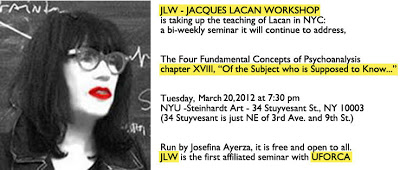
« Take the experience of the beautiful butcher’s wife. She loves caviar, but she doesn’t want any. That’s why she desires it. You see, the object of desire is the cause of the desire, and this object that is the cause of desire is the object of the drive—that is to say, the object around which the drive turns. Since I am here in a dialogue with someone who has worked on my texts, I may express myself in some rather concentrated formulae. It is not that desire clings to the object of the drive—desire moves around it, in so far as it is agitated in the drive. But all desire is not necessarily agitated in the drive. There are empty desires or mad desires that are based on nothing more than the fact that the thing in question has been forbidden you. By virtue of the very fact that it has been forbidden you, you cannot do otherwise, for a time, than think about it. That, too, is desire. But whenever you are dealing with a good object, we designate it —it’s a question of terminology, but a justified terminology —as an object of love. Next time, I will this by articulating the relation between love, the transference and desire. » Jacques Lacan, June 1964
![]()
Lacanian Ink on Facebook.








